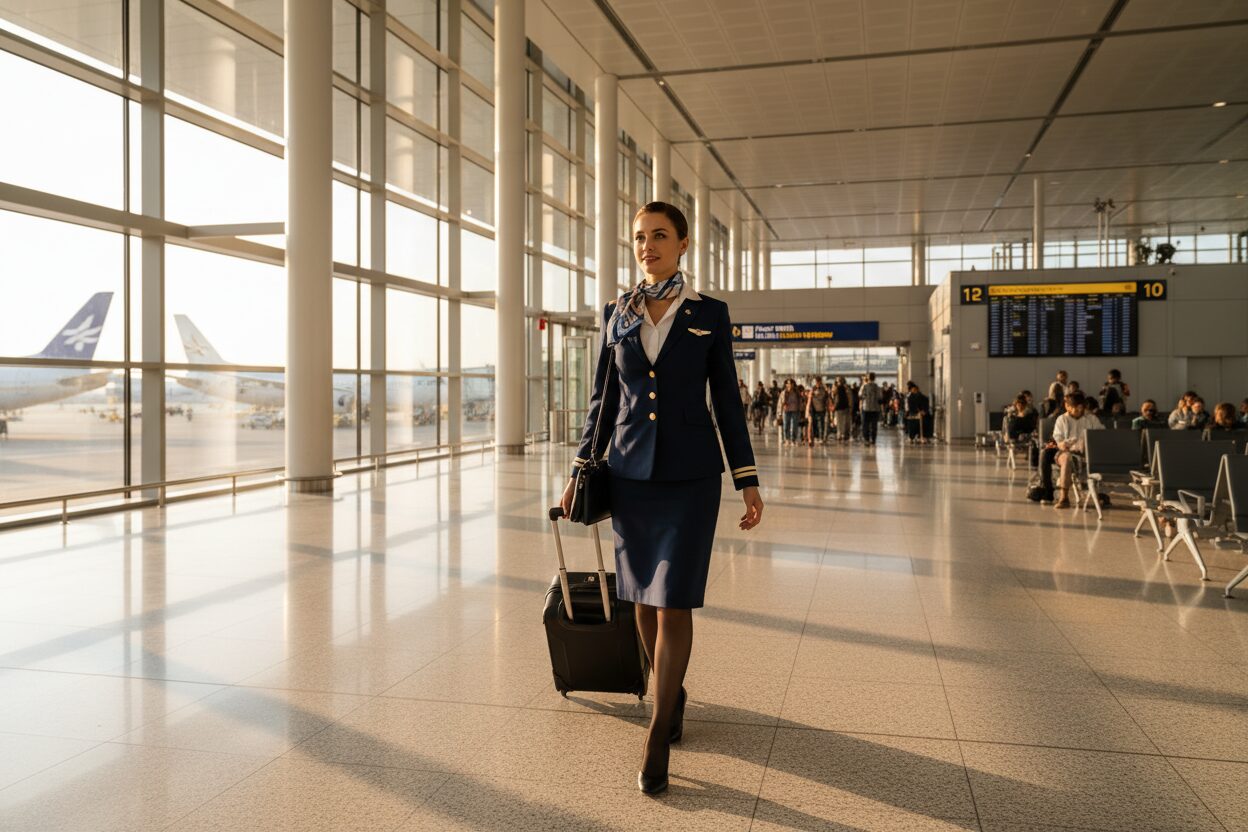Embarking on a career as cabin crew can be an exciting and rewarding journey. With the aviation industry continuously expanding, there are numerous opportunities for aspiring cabin crew members. This comprehensive guide will walk you through each step to launch a successful cabin crew career, from meeting basic requirements to landing your first job.
Table of Contents
Understanding the Requirements to Become Cabin Crew
Before applying, it’s essential to assess whether you meet the basic criteria set by airlines. These requirements ensure you are physically and professionally prepared to handle the challenges of the role.
Key Qualifications
- Minimum height of 155 cm for safety and operational reasons
- Ability to swim, in case of water landing emergencies
- Exceptional proficiency in English, both spoken and written
- High school diploma or equivalent; college or university education is an added advantage
- No visible tattoos when wearing a uniform, respecting different cultural attitudes towards tattoos worldwide
- A valid Medical Cabin Crew certificate confirming good health
Besides these basic requirements, a charming, approachable personality, excellent communication skills, and adaptability are crucial to excel in this role. For tips on how to best present these qualities, see our detailed guide on How to write a Cabin Crew CV: tips for success. Demonstrating multilingual abilities can also set you apart, especially for international airlines—as explained in our post on the Top 3 Benefits of Being a Multilingual Cabin Crew.
Preparing Your Application: Crafting an Effective CV
Your CV is your first impression. A well-structured CV highlighting your qualifications, experience, and language skills can significantly boost your chances of getting hired.
Emphasize previous roles in customer service, hospitality, or retail, as these are highly relevant for airline cabin crew positions. Demonstrating multilingual abilities can also set you apart, especially if applying to international airlines.
While prior experience is beneficial, it’s not always necessary. Low-cost airlines often hire less experienced candidates, providing an excellent stepping stone toward working with major carriers.
Participating in Airline Screening Processes
Most airlines conduct screening days or assessment centers to evaluate potential candidates. These sessions involve team exercises, scenario-based problem solving, and personal interviews.
During screening, expect to
- Attend a company presentation highlighting employee benefits and work conditions
- Engage in team-based activities to demonstrate collaboration skills
- Participate in scenario exercises to test your stress management and problem-solving abilities
- Interview with airline representatives this is your chance to shine and showcase your personality and professionalism
Always bring your updated CV, a recent ID photo, and be prepared to clarify your motivation for becoming cabin crew. Remember, each airline may have slight variations in their recruitment process, so research thoroughly before attending interviews.
Applying for Cabin Crew Positions
Applying online provides a straightforward way to find opportunities. Register on airline career portals or specialized job boards, upload your CV, and submit applications for suitable positions.
Airlines often contact shortlisted candidates via email or phone for interviews, which may be individual or group sessions. Exercise caution. Never pay for training upfront. Legitimate airlines provide free training, and any request for payment is a scam. Report such incidents to the job boards immediately.
Keep an eye on official airline career pages or our trusted job site, AviationCV for the latest openings. To understand the challenges of this career before applying, review our post on 5 Tough Reasons Why Being a Cabin Crew Is Not Easy.
Enhancing Your Skills Through Training
Attending professional cabin crew training programs can significantly improve your employability. While these courses involve costs, they prepare you for the realities of the job and increase your chances of success.
Some training schools have partnerships with airlines, facilitating direct recruitment post-certification. Completing such training not only boosts your resume but also provides confidence and practical skills necessary for the role.
Costs vary depending on the institution. For example, BAA Cabin Crew Training charges around 1200€. Information about other reputable programs can be found through their official websites.
For those curious about long-term growth and career trajectories, our article on Is there career progression for Cabin Crew? gives valuable insights.
Key Tips for Aspiring Cabin Crew
- Be proactive and apply to multiple airlines and attend screening days
- Prepare thoroughly for interviews by practicing common questions and scenario responses
- Maintain a positive attitude and genuine enthusiasm for flying
- Invest in professional training if possible to stand out from other applicants
- Avoid scams and never pay for airline training before signing a contract
Frequently Asked Questions
Q: What qualities do airlines look for in cabin crew?
Airlines seek friendly, adaptable, and professional individuals with excellent communication skills, a positive attitude, and the ability to handle stressful situations calmly.
Q: Is prior experience necessary?
Not always. Many airlines hire candidates without experience, especially low-cost carriers. However, experience in customer service can enhance your application.
Q: Can I become cabin crew if I don’t speak English fluently?
English proficiency is typically a requirement. Improving your language skills can open up more opportunities and increase your chances of success.
Q: How much does cabin crew training cost?
Training costs range from about 1200€ to several thousand euros, depending on the school. Always verify the credibility of training providers and check if airlines have partnerships with them. For insights into expected compensation after entering the profession, see Cabin crew salary: What you can expect to earn and what impacts it.
Conclusion
Starting a career as cabin crew involves a combination of meeting basic qualifications, preparing a compelling CV, participating in screening processes, and possibly attending paid training. The key is to stay proactive, prepared, and positive. With determination and effort, you’ll be airborne in no time, serving passengers around the world and enjoying a dynamic career full of adventure.

